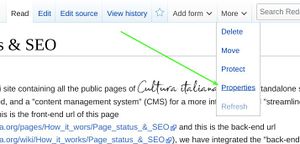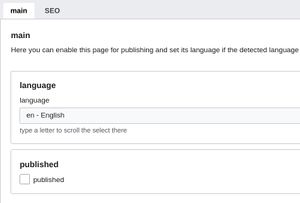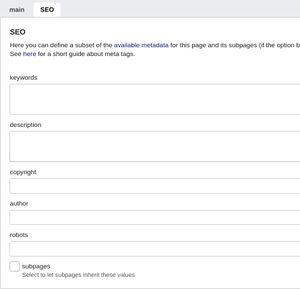Page status & SEO link
Since the Mediawiki site containing all the public pages of Cultura italiana is both a standalone site which can be autonomously visited, and a "content management system" (CMS) of a font-end allowing a more interactive and "streamlined" experience (as an example this is the "front-end" url of this page https://culturaitaliana.org/pages/How_it_works/Page_status_&_SEO and this is the "back-end" url https://culturaitaliana.org/wiki/How_it_works/Page_status_&_SEO, in the sense now explained), we have integrated the "back-end" with a way to define some property for each page, and specifically its publishing state, its language, and even some meta-data to be used for SEO ("search engine optimization") purposes.
The properties panel can be accessed from the menu on top (see picture 1)
and is composed by two sections, the first (picture 2), where you can set the page language and its published status and the second (picture 3) where you can set some meta properties for "SEO" purposes. Of course we expect that this section will be mainly used for the main page of an organization, and the checkbox "subpages" allows to "propagate" the set meta-data to all its sub-pages.
That being said, it is to note mainly the following:
- a new created page gets a "draft" (non-published) status and therefore is accessible only to logged-in user affiliated to the related organization (if any) or site moderators. (So it's fundamental that once the page is ready for publishing, you remember to update its status)
- Cultura italiana tries to detect the page language on saving, where the language is used to let visitors selecting pages based on the language. However, because we have set an high "index of confidence" for relying on the automated detection, the language value could remain empty (rather than wrong) therefore a manual setting might be required.
- the languages select can be scrolled just typing the initial letters of the desired language above it: this is a "tip" to immediately find the desired language in the list
- the "SEO" section contains a "subset" of all the meta-data available (or just conceived) for html pages. Here is the complete list. Some of them are just inappropriate, some else are not really taken into account by search engines, some else might conflict with the values set for the functioning of the underlying site, so as for now (end of November 2020) we use that subset, but others fields might be added if there is a good reason in doing that.
- still the "SEO" section contains, among the "meta-data", a "robot" field. This is among the significant properties (taken into account by search engines) and of course it might be used to avoid that a search engine indexes the page, if you don't want so. It's also to be noted that all the meta-data set are immediately used both on the back-end and on the front-end, so your settings will be respected in any case.
- As mentioned the checkbox "subpages" allows to "propagate" the meta-data set for a given page to all its sub-pages, unless a field is not set in a given sub-page: in this case the value of descendant prevails.
- The pages with a non-published status will be not either visible in the related Table of contents, and the checkbox in the Table of contents form does not modify the published status of a page: it just affects whether or not the page will appear in the navigation panel on the front-end. For instance pages created through a form containing not other information but the form fields (like, usually, News pages) can be set as published and they will appear in the related front-end section (this one to the example) however they might be unselected in the Table of Contents so that they will not appear in the page itself of the organization (this one to the example) mainly because they have not a "raw" content. The "rule of thumb" in this case is that a non-published page will never be served both on the front-end and the back-end, and a published page will be always served if it contains a form (that is semantic data) and not served on the front-end if it does not contain semantic data and it's unselected in the Table of Contents.
Finally, with reference of pages not yet published, it is worth to repeat the considerations already stated with regards of Multiple choice questions, that is that this feature is not meant to conceal sensitive information: just to postpone the publishing of information inherently intended for the public domain, when the author deems they are ready.


